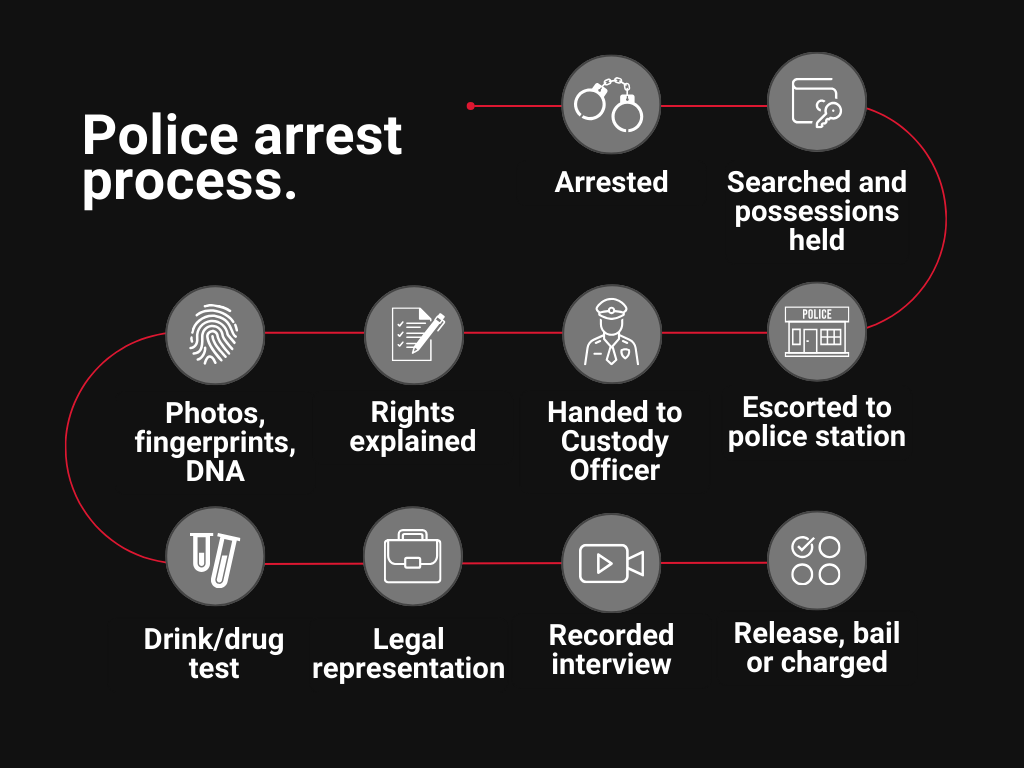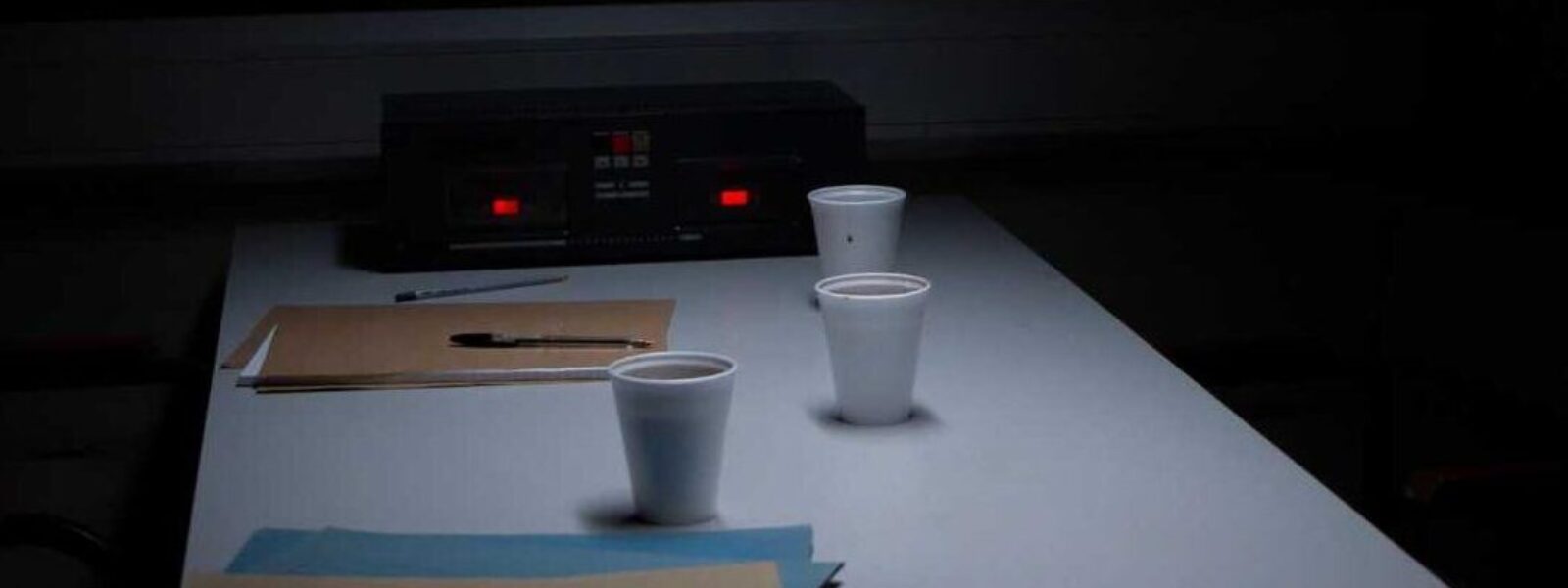When the police arrest you, it can be a very unsettling and stressful situation. Most people haven’t experienced an arrest before and have no idea what is involved.
Understanding your rights and responsibilities during a police arrest is crucial. Being informed can help you navigate the process more effectively and protect your rights.
In this blog post, I provide a comprehensive guide on what to expect during a police arrest in England and Wales, and the steps you can take to ensure a fair and lawful process.
As an experienced Criminal Defence Associate Solicitor, I have attended many interviews and guided my clients through the process, helping to protect and advance their rights to ensure I act in their best interest.
If you need or think you will need legal representation at a police station, please take note of my details, Rojin Tasman, Criminal Defence Associate Solicitor from Britton and Time, 020 3007 5500.
What are the reasons for a police arrest?
A lawful police arrest must consist of two elements:
- The person’s suspected, attempted or actual involvement in a criminal offence.
- A reasonable belief that the arrest is necessary.
The police can only arrest you if they have reasonable grounds to suspect your involvement in a crime AND it is necessary to do so. In the first instance, they should consider a voluntary interview if the two elements are not satisfied.
Regardless of whether it’s obvious or not, the police must inform the person that they are under arrest and the reason. The custody officer at the police station requires all this information to ensure the arrest is lawful.
Do the police need a warrant to arrest me?
The police don’t need a warrant to arrest you as long as they have reasonable grounds to suspect you have committed, are going to commit, or are committing a crime.
What are some examples of arrestable offences?
Most criminal offences can lead to an arrest if it is necessary. Some examples include:
- Driving under the influence of alcohol or drugs
- Sexual assault
- Committing violence towards another person
- Hooliganism displayed at sports events
- Theft, robbery, burglary.
This is a non-exhaustive list, and the arrest can happen before, during or any time after the offence has taken place.
Where can a police arrest take place?
The police have the power to arrest you anywhere, whether you’re at home, work, or out in public. They can also arrest you at any time of day and night.
The only exception is for the arrest of an under 18-year-old which should ideally not take place at a school. If it does need to happen during school time, the police should inform the head teacher.
In the first instance, the police should offer under 18s a voluntary interview with an appropriate adult present. An arrest should be a last resort.
What happens if I resist a police arrest?
You should avoid resisting arrest as you could face an additional charge for ‘assault with intent to resist arrest’.
The police can use reasonable force to prevent fleeing or violence during the arrest.
Examples of reasonable force include:
- Handcuffs
- Body restraint e.g. holding your arms
- Using equipment e.g. a baton.
Reasonable force is only appropriate if it’s justified for those circumstances and the force used is proportionate.
What if I have children or dependants with me during a police arrest?
No set guideline exists for an arrest that takes place with dependent children present. The police assess each situation independently and consider many factors when deciding on the best course of action.
If your arrest was for a minor crime and you can’t tamper with any evidence, they may arrest you at a later date or invite you to a voluntary interview.
You may get the chance to arrange someone else to look after your children.
If the crime is serious, you can tamper with evidence, or the children are victims of the crime, then the police will involve Child Protective Services following guidance (Working Together to Safeguard Children 2023).
Citizen’s arrest
Citizen’s arrests are legal in England and Wales. They are only appropriate when law enforcement isn’t able to make the arrest themselves and the perpetrator is either committing a serious crime or fleeing from the scene.
It’s a rarely used practice due to the complex nature and risks to the ‘citizen’ if it were to go wrong.
What happens when you are arrested?
The process of your police arrest may vary depending on the nature of the crime committed and your response. Here is a general overview of the police arrest process:
- The arresting officer will explain why you are being arrested and confirm your rights.
“You do not have to say anything. But it may harm your defence if you do not mention when questioned something which you later rely on in court. Anything you do say may be given in evidence.” - You’re searched and your possessions are secured and held.
- Initial drink and drug test if your arrest is due to a related offence.
- Police escort you to the nearest police station/custody.
- The police station’s Custody Officer processes your arrest.
- The police will explain your rights – including your right for legal representation.
- Collection of photos, fingerprints, DNA, and skin swabs – the police don’t need permission to obtain these.
- A secondary drink and drug test if your arrest is due to a related offence.
- Interview takes place and is recorded as evidence.
- The police will either take No Further Action, release you on bail or remand you to court as a result of a charge.
The police should inform you of the next course of action once they decide whether to release you or refer your matter to their superior/Sergeant for a potential charging decision if the matter is sent up to the Crown Prosecution Service. The police do not have the power to charge; ultimately their role is to investigate.

What are my rights if I’m under police arrest?
When you’re in police custody, you still have rights, and it’s important that the police respect your rights. As your solicitor, I will ensure that the process is complied with competently and efficiently.
Your rights under police arrest include:
- To choose a person to notify of your arrest and the reason for your arrest.
- The right to legal representation, including receiving free legal advice at the police station.
- The right to remain silent – you don’t have to answer any questions, especially not without consulting your solicitor first.
- Medical assistance if you need it.
- To see the police codes of practice.
- A written notice outlining your rights.
It’s a common belief that you can have visitors whilst in custody. But this is only the case if you’re under 18 or vulnerable, therefore, requiring an appropriate adult during your consultations and interview.
What happens after I’m arrested?
After processing and interviews, the police either take no further action, release, or charge you.
The best outcomes are a release with no charge and no further action or a caution.
The police could interview you and decide there isn’t enough evidence to charge you. Or, you may have a strong alibi, meaning that the police will release you to make further enquiries before deciding on a charge.
They could release you under investigation, meaning you face no bail conditions. However, you may still need to return to the police station if they contact you.
If the police release you on bail, they will request that you return for further questioning at a later date. It is important that you comply with this request. You can call on your legal representative during this time.
You could be given conditional bail. This will allow you to leave the police station under certain conditions, for example non-contact, curfews, and travel restrictions. The conditions will depend on the alleged offence and what risks you pose upon your release.
During your assessment with a medical practitioner, they could decide to section you under the Mental Health Act. Alternatively, you can volunteer yourself as a patient if you already have a mental health diagnosis and need prescribed medication. You need to be fit to sit the interview and have an appropriate adult if needed i.e. for mental health conditions or learning difficulties.
Whatever the outcome, your solicitor will guide you through the process.
The dos and don’ts of a police arrest
To recap, here is a list of things that I recommend you keep in mind when going through a police arrest.
Do:
- Activate your right to silence concerning any questions of your alleged offending behaviour
- Ask for legal representation
- Remain calm and try not to escalate the situation
- Comply with police instructions
- Provide basic information required by police
- Listen to what the police charged you with
- Ask about and understand your rights under arrest
Don’t:
- Resist arrest – this can amount to a criminal offence in itself
- Volunteer information, especially before speaking to your legal representative
- Argue or become aggressive as this could lead to further charges
- Sign anything without understanding
- Waive your right to legal representation.
You should contact your solicitor as soon as possible following an arrest so they can clarify and reinforce this information.
Does a police arrest show up on your criminal record?
A police arrest will not go on your criminal record. Although, if the police deem it appropriate, they can disclose certain information concerning the offence.
The Disclosure and Barring Service (DBS) holds the authority to disclose certain non-conviction information if it is relevant, proportionate, and in the public interest to ensure the safety and well-being of vulnerable individuals.
If there is no further action on the investigation, you can apply for deletion of your arrest record.
What can I do if I’ve been wrongly arrested?
If you believe your arrest was unlawful or you were treated unfairly, you can make a complaint against the police.
To do this you can contact the police station directly about your complaint. Depending on the type of complaint, they will deal with it internally or refer it to the Independent Office for Police Conduct.
My clients are often concerned about how the police have handled their case and will inform me of wrongdoing. Due to this, I have worked on many complaints and Claims Against Public Authorities’ cases. I would be happy to discuss any potential complaints/claims with you.
Experiencing a police arrest can be daunting. Knowing your rights and understanding the legal process can help you navigate the situation with confidence and awareness.
This guide serves as a starting point for individuals facing police arrest in the UK. If you need legal representation during or following a police arrest, please contact me. I can support you with your case.











Leave a comment Your email address will not be published.